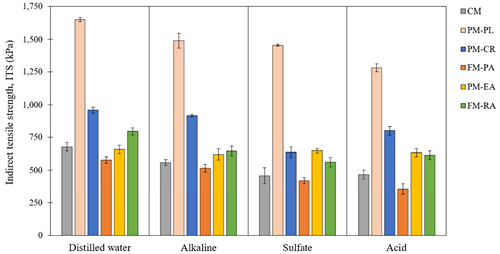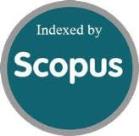Evaluation on Mechanical Deterioration of the Asphalt Mixtures Containing Waste Materials When Exposed to Corrosion Solutions
DOI:
https://doi.org/10.46604/ijeti.2022.8766Keywords:
asphalt, waste material, mechanical deterioration, tensile strength, corrosion resistanceAbstract
This research investigates the effect of corrosion solutions on the mechanical properties of asphalt concrete mixtures. A control asphalt mixture (CM) and five polymer-modified (PM) or filler-modified (FM) mixtures containing waste materials are prepared, namely PM high-density polyethylene plastic (PM-PL), PM crumb rubber (PM-CR), FM Para wood ash (FM-PA), FM palm empty fruit bunch ash (FM-EA), and FM rice husk ash (FM-RA). The experiment is conducted by immersing the mixture specimens in four types of water solutions (i.e., distilled water, alkaline solution, sulfate solution, and acid solution), followed by the splitting tests. Finally, the corrosion resistance factor (fc) is computed to assess the corrosive effect of the corrosion solutions. The results show that the degree of reduction in tensile strength mainly depends on the type of corrosion solutions, type of mixtures, and immersion time. FM-EA provides better resistance under the alkaline and acid solutions, while PM-PL exhibits the greatest fc under the sulfate solution. Among all the mixtures, PM-PL shows the greatest ability in withstanding the corrosion solutions.
References
J. Li, F. Xiao, L. Zhang, and S. N. Amirkhanian, “Life Cycle Assessment and Life Cycle Cost Analysis of Recycled Solid Waste Materials in Highway Pavement: A Review,” Journal of Cleaner Production, vol. 233, pp. 1182-1206, October 2019.
M. Attaelmanan, C. P. Feng, and A. Al-Hadidy, “Laboratory Evaluation of HMA with High Density Polyethylene as a Modifier,” Construction and Building Material, vol. 25, no. 5, pp. 2764-2770, May 2011.
J. Choudhary, B. Kumar, and A. Gupta, “Application of Waste Materials as Fillers in Bituminous Mixed,” Waste Management, vol. 78, pp. 417-425, August 2018.
A. Horvath, “Life-Cycle Environmental and Economic Assessment of Using Recycled Materials for Asphalt Pavements,” Department of Civil and Environmental Engineering, University of California, Technical Report, September 12, 2003.
J. C. Nicholls, M. J. McHale, and R. D. Griffths, Best Practice Guide for Durability of Asphalt Pavements, Wokingham: Transport Research Laboratory, 2008.
Y. Becker, M. P. Méndez, and Y. Rodríguez, “Polymer Modified Asphalt,” Vision Tecnologica, vol. 9, no. 1, pp. 39-48, 2001.
S. Haider, I. Hafeez, Jamal, and R. Ullah, “Sustainable Use of Waste Plastic Modifiers to Strengthen the Adhesion Properties of Asphalt Mixtures,” Construction and Building Materials, vol. 235, 117496, February 2020.
M. B. Khurshid, N. A. Qureshi, A. Hussain, and M. J. Iqbal, “Enhancement of Hot Mix Asphalt (HMA) Properties Using Waste Polymers,” Arabian Journal for Science and Engineering, vol. 44, no. 10, pp. 8239-8248, February 2019.
L. Brasileiro, F. Moreno-Navarro, R. Tauste-Martínez, J. Matos, and M. D. C. Rubio-Gámez, “Reclaimed Polymers as Asphalt Binder Modifiers for More Sustainable Roads: A Review,” Sustainability, vol. 11, no. 3, 646, January 2019.
M. A. Bidgoli1, K. Naderi, and F. M. Nejad, “Effect of Filler Type on Moisture Susceptibility of Asphalt Mixtures Using Mechanical and Thermodynamic Properties,” Journal of Materials in Civil Engineering, vol. 31, no. 4, 04019024, April 2019.
R. Mistry and T. K. Roy, “Performance Evaluation of Bituminous Mix and Mastic Containing Rice Husk Ash and Fly Ash as Filler,” Construction and Building Materials, vol. 268, 121187, January 2021.
H. Yang, L. Pang, Y. Zou, Q. Liu, and J. Xie, “The Effect of Water Solution Erosion on Rheological, Cohesion and Adhesion Properties of Asphalt,” Construction and Building Materials, vol. 246, 118465, June 2020.
B. Sengoz and E. Agar, “Effect of Asphalt Film Thickness on the Moisture Sensitivity Characteristics of Hot-Mix Asphalt,” Building and Environment, vol. 42, no. 10, pp. 3621-3628, October 2007.
Z. Zhou, H. Li, X. Liu, and W. He, “Investigation of Sea Salt Erosion Effect on the Asphalt-Aggregate Interfacial System,” International Journal of Pavement Research and Technology, vol. 13, no. 2, pp. 145-153, March 2020.
A. Almeida, J. Crucho, C. Abreu, and L. Picado-Santos, “An Assessment of Moisture Susceptibility and Ageing Effect on Nanoclay-Modified AC Mixtures Containing Flakes of Plastic Film Collected as Urban Waste,” Applied Sciences, vol. 9, no. 18, 3738, September 2019.
S. Chen, B. Guan, R. Xiong, Y. Sheng, and R. He, “Durability of Asphalt Mixture in Different Corrosion Solution,” Journal of Wuhan University of Technology—Materials Science Edition, vol. 26, no. 6, pp. 1200-1204, December 2011.
R. Xiong, L. Wang, B. Guan, Y. Sheng, and X. Yang, “Durability Prediction of Asphalt Mixture Exposed to Sulfate and Dry-Wet Circle Erosion Environment,” International Journal of Pavement Research and Technology, vol. 8, no. 1, pp. 53-57, January 2015.
Q. Li, K. Li, K. Zhao, G. Sun, and S. Luo, “Fuel Oil Corrosion Resistance of Asphalt Mixtures,” Construction and Building Materials, vol. 220, pp. 10-20, September 2019.
K. Zhang, W. Li, and F. Han, “Performance Deterioration Mechanism and Improvement Techniques of Asphalt Mixture in Salty and Humid Environment,” Construction and Building Materials, vol. 208, pp. 749-757, May 2019.
S. Feng, W. Wang, H. Tan, M. Xue, and K. Höeg, “Effects of Acidic Water on Hydro-Mechanical Properties of Asphalt Concrete,” Case Studies in Construction Materials, vol. 13, e00445, December 2020.
Y. Zou, S. Amirkhanian, S. Xu, Y. Li, Y. Wang, and J. Zhang, “Effect of Different Aqueous Solutions on Physicochemical Properties of Asphalt Binder,” Construction and Building Materials, vol. 286, 122810, June 2021.
S. Likitlersuang and T. Chompoorat, “Laboratory Investigation of the Performances of Cement and Fly Ash Modified Asphalt Concrete Mixtures,” International Journal of Pavement Research and Technology, vol. 9, no. 5, pp. 337-344, August 2016.
J. Read and D. Whiteoak, The Shell Bitumen Handbook, 5th ed., London: Thomas Telford Services Ltd., 2003.
H. I. Gomes, W. M. Mayes, M. Rogerson, D. I. Stewart, and I. T. Burke, “Alkaline Residues and the Environment: A Review of Impacts, Management Practices and Opportunities,” Journal of Cleaner Production, vol. 112, no. 4, pp. 3571-3582, January 2016.
Standard Practice for Preparation of Bituminous Specimens Using Marshall Apparatus, ASTM D6926, 2010.
Standard Test Method for Marshall Stability and Flow of Bituminous Mixtures, ASTM D6927, 2010.
Standard Test Method for Indirect Tensile (IDT) Strength of Asphalt Mixtures, ASTM D6931, 2017.
Standard Test Method for Effect of Moisture on Asphalt Concrete Paving Mixtures, ASTM D4867, 2009.
B. H. Setiadji, S. Utomo, and Nahyo, “Effect of Chemical Compounds in Tidal Water on Asphalt Pavement Mixture,” International Journal of Pavement Research and Technology, vol. 10, no. 2, pp. 122-130, March 2017.
A. Mamun, H. I. Al-Abdul Wahhab, and M. A. Dalhat, “Comparative Evaluation of Waste Cooking Oil and Waste Engine Oil Rejuvenated Asphalt Concrete Mixtures,” Arabian Journal for Science and Engineering, vol. 45, pp. 7987-7997, October 2020.

Published
How to Cite
Issue
Section
License
Copyright Notice
Submission of a manuscript implies: that the work described has not been published before that it is not under consideration for publication elsewhere; that if and when the manuscript is accepted for publication. Authors can retain copyright in their articles with no restrictions. Also, author can post the final, peer-reviewed manuscript version (postprint) to any repository or website.

Since Jan. 01, 2019, IJETI will publish new articles with Creative Commons Attribution Non-Commercial License, under Creative Commons Attribution Non-Commercial 4.0 International (CC BY-NC 4.0) License.
The Creative Commons Attribution Non-Commercial (CC-BY-NC) License permits use, distribution and reproduction in any medium, provided the original work is properly cited and is not used for commercial purposes.







.jpg)


